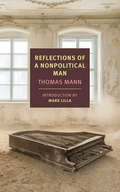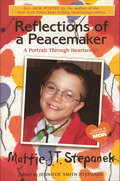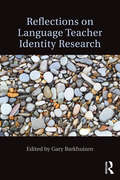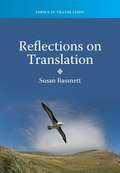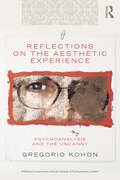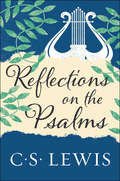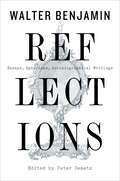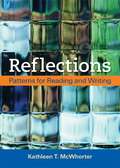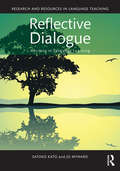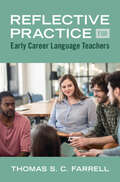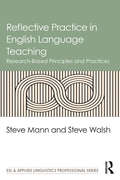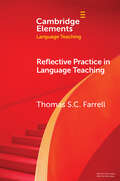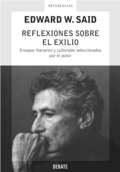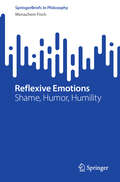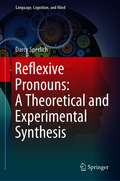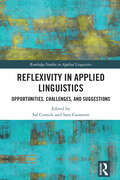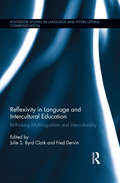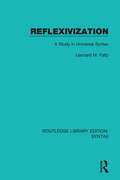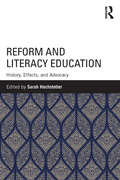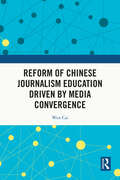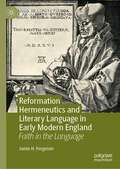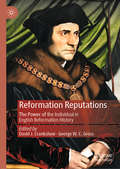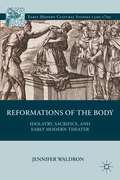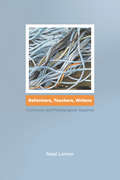- Table View
- List View
Reflections of a Nonpolitical Man
by Thomas MannA classic, controversial book exploring German culture and identity by the author of Death in Venice and The Magic Mountain, now back in print.When the Great War broke out in August 1914, Thomas Mann, like so many people on both sides of the conflict, was exhilarated. Finally, the era of decadence that he had anatomized in Death in Venice had come to an end; finally, there was a cause worth fighting and even dying for, or, at least when it came to Mann himself, writing about. Mann immediately picked up his pen to compose a paean to the German cause. Soon after, his elder brother and lifelong rival, the novelist Heinrich Mann, responded with a no less determined denunciation. Thomas took it as an unforgivable stab in the back.The bitter dispute between the brothers would swell into the strange, tortured, brilliant, sometimes perverse literary performance that is Reflections of a Nonpolitical Man, a book that Mann worked on and added to throughout the war and that bears an intimate relation to his postwar masterpiece The Magic Mountain. Wild and ungainly though Mann&’s reflections can be, they nonetheless constitute, as Mark Lilla demonstrates in a new introduction, a key meditation on the freedom of the artist and the distance between literature and politics.The NYRB Classics edition includes two additional essays by Mann: &“Thoughts in Wartime&” (1914), translated by Mark Lilla and Cosima Mattner; and &“On the German Republic&” (1922), translated by Lawrence Rainey.
Reflections of a Peacemaker: A Portrait through Heartsongs
by Mattie J.T. StepanekMattie J. T. Stepanek lived and died a child, but he had the spirit of a giant. Affected by a rare and fatal neuromuscular disease, Mattie lived almost fourteen years but in that time became a poet, best-selling author, peace activist, and a prominent voice for the Muscular Dystrophy Association. Before his death in June 2004, his five volumes of Heartsongs poetry sold more than a million copies.Reflections of a Peacemaker: A Portrait Through Heartsongs is the final collection of Heartsongs that Mattie was working on when he died. It includes the last poem Mattie penned along with a special collection of unpublished poetry, photographs, and artwork spanning the decade from when he began writing Heartsongs at age three.Culled from the thousands of poems, essays, and journal entries Mattie left behind, the entries in Reflections of a Peacemaker create a portrait of Mattie in his own words. In these poems he explores disability, despair, and death but also the gifts he finds in nature, prayer, peace, and his belief in something "bigger and better than the here and now." The poems are grouped by theme such as playful, stormy, sacred, and final Heartsongs, with each section introduced by a personal tribute from the likes of Maya Angelou, Oprah Winfrey, Larry King, and former President Jimmy Carter.In the words of Mattie's mother, Jeni Stepanek, who has published Reflections of a Peacemaker at her son's request, "In reading these poems we enter Mattie's world and gain insight through a child who somehow balanced pain and fear with optimism and faith."
Reflections on Language Teacher Identity Research
by Gary BarkhuizenReflections on Language Teacher Identity Research is the first book to present understandings of language teacher identity (LTI) from a broad range of research fields. Drawing on their personal research experience, 41 contributors locate LTI within their area of expertise by considering their conceptual understanding of LTI and the methodological approaches used to investigate it. The chapters are narrative in nature and take the form of guided reflections within a common chapter structure, with authors embedding their discussions within biographical accounts of their professional lives and research work. Authors weave discussions of LTI into their own research biographies, employing a personal reflective style. This book also looks to future directions in LTI research, with suggestions for research topics and methodological approaches. This is an ideal resource for students and researchers interested in language teacher identity as well as language teaching and research more generally.
Reflections on Translation
by Susan BassnettThis collection of essays brings together a decade of writings on translation by leading international translation studies expert, Susan Bassnett. The essays cover a range of topics and will be useful to anyone with an interest in how different cultures communicate. Bassnett draws upon her personal experience to explore issues such as why the same things cannot be expressed in all languages, why translators in war zones risk their lives for their work, whether humour can travel across cultures, why translated menus are often so bad and whether poetry does indeed get lost in translation.
Reflections on the Aesthetic Experience: Psychoanalysis and the uncanny (The New Library of Psychoanalysis 'Beyond the Couch' Series)
by Gregorio KohonInterest in the relationship between psychoanalysis and art - and other disciplines - is growing. In his new book Reflections on the Aesthetic: Psychoanalysis and the uncanny, Gregorio Kohon examines and reflects upon psychoanalytic understandings of estrangement, the Freudian notions of the uncanny and Nachträglichkeit, exploring how these are evoked in works of literature and art, and are present in our response to such works. Kohon provides close readings of and insights into the works of Franz Kafka, Jorge Luis Borges, Louise Bourgeois, Juan Muñoz, Anish Kapoor, Richard Serra, Edvard Munch, Kurt Schwitters, amongst others; the book also includes a chapter on the Warsaw Ghetto Monument and the counter-monument aesthetic movement in post-war Germany. Kohon shows how some works of art and literature represent something that otherwise eludes representation, and how psychoanalysis and the aesthetic share the task of making a representation of the unrepresentable. Reflections on the Aesthetic is not an exercise in "applied" psychoanalysis; psychoanalysis and art are considered by the author in their own terms, allowing a new understanding of the aesthetic to emerge. Kohon’s book makes compelling reading for psychoanalysts, psychotherapists, art therapists, literary and art critics, academics, students and all those interested in the matter of the aesthetic.
Reflections on the Psalms: The Pilgrim's Regress / Prayer: Letter To Malcolm / Reflections On The Psalms / Till We Have Faces / The Abolition Of Man
by C. S. LewisA repackaged edition of the revered author’s moving theological work in which he considers the most poetic portions from Scripture and what they tell us about God, the Bible, and faith.In this wise and enlightening book, C. S. Lewis—the great British writer, scholar, lay theologian, broadcaster, Christian apologist, and bestselling author of Mere Christianity, The Screwtape Letters, The Great Divorce, The Chronicles of Narnia, and many other beloved classics—examines the Psalms. As Lewis divines the meaning behind these timeless poetic verses, he makes clear their significance in our daily lives, and reminds us of their power to illuminate moments of grace.
Reflections: Essays, Aphorisms, Autobiographical Writings
by Walter BenjaminThe towering twentieth century thinker delve into literature, philosophy, and his own life experience in this “extraordinary collection” (Publishers Weekly). A companion volume to Illuminations, the first collection of Walter Benjamin’s writings, Reflections presents a further sampling of his wide-ranging work. Here Benjamin evolves a theory of language as the medium of all creation, discusses theater and surrealism, reminisces about Berlin in the 1920s, recalls conversations with Bertolt Brecht, and provides travelogues of various cities, including Moscow under Stalin.Benjamin moves seamlessly from literary criticism to autobiography to philosophical-theological speculations, cementing his reputation as one of the greatest and most versatile writers of the twentieth century. “This book is just that: reflections of a highly polished mind that uncannily approximate the century’s fragments of shattered traditions.” —Time
Reflections: Patterns for Reading and Writing
by Kathleen T. McwhorterThis innovative modes-based reader by reading expert Kathleen McWhorter supports an integrated approach to reading and writing with unique scaffolded instruction that guides students through comprehension, analysis, evaluation, and written response — skills students will need to be successful in college. Compelling reading selections drawn from widely taught academic disciplines let students practice the work they’re expected to do in other college courses.
Reflective Dialogue: Advising in Language Learning (Research and Resources in Language Teaching)
by Jo Mynard Satoko KatoReflective Dialogue presents professional educators with the necessary background and skills to engage in reflective dialogue with language learners effectively. It draws on work in the fields of advising in language learning, reflective practice, sociocultural theory, language learner autonomy, counseling, and life coaching to provide both an introduction to the field and guidance for researching advising in action. The book also includes a wide variety of practical ideas and over 30 sample dialogues that offer clear demonstrations of the concepts discussed in practice. This dynamic textbook’s practical approach illustrates how reflective dialogue can promote language learner autonomy and how language advising can be implemented successfully both inside and outside the classroom.
Reflective Practice for Early Career Language Teachers
by Thomas S. FarrellBased on a range of detailed case studies, this innovative book presents a model for early career language teacher development. It showcases the lived experiences of English language teachers in their training years, as well as the reflections of two more experienced English language teachers, and uses these case studies to provide practical guidelines on early career needs and development. It outlines four essential and highly connected conditions that will enable teachers to survive and thrive in the profession: reflection, support, resilience, and well-being. Using an innovative, evidence-based, data-informed approach to reflective practice, the book covers teachers' philosophy, principles, theory, practice, and critical reflection beyond practice. Each chapter contains practical reflection activities, to encourage reflection throughout from the reader on what the research reveals. It is essential reading for graduate students who are training to become language teachers, as well as language teacher trainers and lecturers.
Reflective Practice in English Language Teaching: Research-Based Principles and Practices (ESL & Applied Linguistics Professional Series)
by Steve Mann Steve WalshOffering a unique, data-led, evidence-based approach to reflective practice in English language teaching, this book brings together theory, research and practice in an accessible way to demonstrate what reflective practice looks like and how it is undertaken in a range of contexts. Readers learn how to do and to research reflective practice in their own settings. Through the use of data, dialogue and appropriate tools, the authors show how reflective practice can be used as an ongoing teaching tool that supports professional self-development.
Reflective Practice in Language Teaching (Elements in Language Teaching)
by Thomas S. FarrellThis Element examines the concept of reflective practice in language teaching. It includes a brief description of what reflective practice is and how it is operationalized by two of its main protagonists, John Dewey and Donald Schön, as well as some of the limitations of their conceptions. This is used as an introduction to how the author further developed their conceptions when operationalizing reflective practice for language teachers through a five-stage framework for reflecting on practice for language teachers. The author then presents an in-depth case study of the reflections of an English as a Foreign Language (EFL) teacher working in Costa Rica as he moved through the five stages of the framework for reflecting on practice. The author then goes on to outline and discuss how reflective practice may be moved forward and calls attention to the importance of emotions in the process of reflection for language teachers.
Reflexiones sobre el exilio: Ensayos literarios y culturales seleccionados por el autor
by Edward W. SaidLa selección definitiva de los ensayos culturales y literarios de Edward W. Said realizada por el propio autor. Este libro reúne ensayos sobre temas culturales y literarios escritos por Edward W. Said a lo largo de tres décadas de intenso trabajo intelectual y político. Vistos en conjunto y con la perspectiva crítica que concede el tiempo, estos textos -seleccionados por el propio autor como compendio de su carrera humanista- nos ofrecen la oportunidad de contemplar la evolución y formación de un combativo profesor, un hombre de palabra y acción, así como el desarrollo de una vocación por el conocimiento del mundo llevada hasta sus últimas consecuencias. De sus reflexiones sobre la cultura popular, que le llevan a calificar a Tarzán de «exiliado permanente» o evocar la figura de la bailarina del vientre Tahia Carioca, al machismo y la tauromaquia de Hemingway, pasando por las diferencias que distinguen ciudades como Alejandría y El Cairo, o sus indispensables capítulos sobre música (Gould, Boulez, Wagner, Beethoven y Bach), el autor de Orientalismo expone en estos artículos su punto de vista inteligente y siempre contrario a la edificación de cánones literarios. Reseña:«El retrato de una vida intelectual ejemplar en la cual rigor y claridad se unen con coraje y compromiso [...] Esta es, con toda seguridad, una de las obras más importantes de la cultura y las humanidades que América ha producido en los últimos años.»Martha C. Nussbaum, The New York Times Book Review
Reflexive Emotions: Shame, Humor, Humility (SpringerBriefs in Philosophy)
by Menachem FischThis book looks closely at three first-order reflexive emotions—shame, humor and humility—that are shown to be not only exclusively human, but definitive of major aspects of human selfhood, agency and normativity. A separate chapter that covers second-order emotions, shows that when negative, they display a crucial and equally exclusive aspect of human normative self-critique. In addition to jointly delineating agency, sapience, normativity, rationality, and the ability to critically self-reflect, this book further demonstrates the inevitable role of the we in the I (to paraphrase Axel Honneth), namely, how realizing one&’s full human potential necessarily requires engaging others. This book appeals to students as well as researchers and looks closely at how these three reflexive emotions bestow categorical value on otherness, rendering normative diversity not merely something to be tolerated or rationally overcome, but a rare and necessary blessing.
Reflexive Pronouns: A Theoretical and Experimental Synthesis (Language, Cognition, and Mind #8)
by Darcy SperlichThis book presents a comprehensive picture of reflexive pronouns from both a theoretical and experimental perspective, using the well-researched languages of English, German, Dutch, Chinese, Japanese and Korean. In order to understand the data from varying theoretical perspectives, the book considers selected syntactic and pragmatic analyses based on their current importance in the field. The volume consequently introduces the Emergentist Reflexivity Approach, which is a novel theoretical synthesis incorporating a sentence and pragmatic processor that accounts for reflexive pronoun behaviour in these six languages. Moreover, in support of this model a vast array of experimental literature is considered, including first and second language acquisition, bilingual, psycholinguistic, neurolinguistic and clinical studies. It is through both the intuitive and experimental data linguistic theorizing relies upon that brings out the strengths of the modelling adopted here, paving new avenues for future research. In sum, this volume unites a diverse array of the literature that currently sits largely divorced between the theoretical and experimental realms, and when put together a better understanding of reflexive pronouns under the auspices of the Emergentist Reflexivity Approach is forged.
Reflexivity in Applied Linguistics: Opportunities, Challenges, and Suggestions (Routledge Studies in Applied Linguistics)
by Sara Ganassin Sal ConsoliThis edited collection provides research-informed guidance on how reflexivity may be practised in applied linguistics research. Specifically, we promote reflexivity as an essential hallmark of quality research and argue that doing reflexivity confers greater transparency, methodological rigour, depth, and trustworthiness to our scholarly inquiries. The collection features perspectives from different sub-fields of applied linguistics, including intercultural communication, language education, and multilingualism, and draws on data from a range of settings, including language cafes, classrooms, workplaces, and migration and displacement contexts. Each chapter follows a unified structure i.e., theoretical background; context of the empirical study used as a backdrop for the chapter; an analysis of how reflexivity played out throughout the study and conclusions which include takeaway points for other researchers. This approach allows readers to gain a sound understanding of the challenges and affordances of doing reflexivity in concrete examples of applied linguistics research whilst also gaining guidance on how to nurture and report on researcher reflexivity as this unfolds throughout the lifetime of a project. This book will appeal to students and scholars in applied linguistics, particularly those with an interest in research methods in the areas of language education, multilingualism, and intercultural communication.
Reflexivity in Language and Intercultural Education: Rethinking Multilingualism and Interculturality (Routledge Studies in Language and Intercultural Communication)
by Fred Dervin Julie S. Byrd ClarkWith the impact of accelerated globalization, digital technologies, mobility, and migration, the fields of Applied Linguistics, Language, and Intercultural Education have been shifting. One shift in need of further exploration is that of systematic and coherent reflexivity in researching language and culture. This unique and timely book thus examines the significance of reflexivity as an integral process, particularly when researching the multifaceted notions of multilingualism and interculturality in education. It also contributes to current critical approaches to representations of languages and cultures in identity politics. As such, the authors offer innovative ways of engaging with reflexivity in teaching, learning, and research through multimodal and complex ways. The chapters span a diverse range of educational settings in Asia, Australia, Europe, and North America.
Reflexivization: A Study in Universal Syntax (Routledge Library Editions: Syntax #7)
by Leonard M. FaltzThis title, first published in 1985, is the result of a cross-linguistic, comparative study of reflexives, with a major role played by syntactic conditions on reflexivization rules. The basic definitions outlined in the book lead to a discussion of morphological types, discussions about syntax, and speculations on the historical origins and destinies of the various kinds of reflexives. This title will be of interest to students of language and linguistics.
Reform and Literacy Education: History, Effects, and Advocacy
by Sarah HochstetlerA critical resource for literacy educators and graduate students, this volume investigates key moments in the development of literacy education and provides a much-needed overview of where, when, and how efforts to shape education influence literacy teaching, as well as what literacy educators can do to advocate for themselves, their students, and the profession. Organized around three themes—history, effects, and advocacy—this volume offers a nuanced exploration of the complex issues surrounding literacy education, and suggests coherent approaches to evaluating and understanding the various policies and reform efforts, and their impacts on literacy teaching and learning. Chapter authors draw on a variety of research– and practice-based perspectives to explore the impact of reform on literacy and literacy education, and examine the evolution of literacy education, providing much-needed historical context for shifts in policies and models in the field.
Reform of Chinese Journalism Education Driven by Media Convergence
by Wen CaiThis book explores the significant changes in Chinese journalism education in response to the rapid development of digital and new media technologies.It emphasizes the need for journalism education reform to keep pace with changing times and cultivate talents with an international outlook, innovative capabilities, and professional skills. It begins by exploring the concept of media convergence and its historical development, as well as the challenges and opportunities it presents for journalism and communication education. In particular, it explains how media convergence affects the demand for journalistic talent and changes the concept of journalism education in China. The author then presents practical examples of journalism education reform in China, including innovations in talent development models, curriculum reforms, and textbook improvements. A case study of reform practices in a top journalism school in China adds depth to the discussion of educational reform and core curriculum development. The author also discusses unresolved issues in journalism education reform, such as the scale of education, the positioning of talent cultivation, and the construction of faculty teams, and proposes solutions.The book will appeal to scholars and students of journalism education, journalism and new media, Chinese journalism, and Chinese studies.
Reformation Hermeneutics and Literary Language in Early Modern England: Faith in the Language (Early Modern Literature in History)
by Jamie H. FergusonThe expressive and literary capacities of post-Reformation English were largely shaped in response to the Bible. Faith in the Language examines the convergence of biblical interpretation and English literature, from William Tyndale to John Donne, and argues that the groundwork for a newly authoritative literary tradition in early modern England is laid in the discourse of biblical hermeneutics. The period 1525-1611 witnessed a proliferation of English biblical versions, provoking a century-long debate about how and whether the Bible should be rendered in English. These public, indeed institutional accounts of biblical English changed the language: questions about the relation between Scripture and exegetical tradition that shaped post-Reformation hermeneutics bore strange fruit in secular literature that defined itself through varying forms of autonomy vis-a-vis prior tradition.
Reformation Reputations: The Power of the Individual in English Reformation History
by David J. Crankshaw George W. C. GrossThis book highlights the pivotal roles of individuals in England’s complex sixteenth-century reformations. While many historians study broad themes, such as religious moderation, this volume is centred on the perspective that great changes are instigated not by themes, or ‘isms’, but rather by people – a point recently underlined in the 2017 quincentenary commemorations of Martin Luther’s protest in Germany. That sovereigns from Henry VIII to Elizabeth I largely drove religious policy in Tudor England is well known. Instead, the essays collected in this volume, inspired by the quincentenary and based upon original research, take a novel approach, emphasizing the agency of some of their most interesting subjects: Protestant and Roman Catholic, clerical and lay, men and women. With an introduction that establishes why the commemorative impulse was so powerful in this period and explores how reputations were constructed, perpetuated and manipulated, the authors of the nine succeeding chapters examine the reputations of three archbishops of Canterbury (Thomas Cranmer, Matthew Parker and John Whitgift), three pioneering bishops’ wives (Elizabeth Coverdale, Margaret Cranmer and Anne Hooper), two Roman Catholic martyrs (John Fisher and Thomas More), one evangelical martyr other than Cranmer (Anne Askew), two Jesuits (John Gerard and Robert Persons) and one author whose confessional identity remains contested (Anthony Munday). Partly biographical, though mainly historiographical, these essays offer refreshing new perspectives on why the selected figures are famed (or should be famed) and discuss what their reformation reputations tell us today.
Reformations Of The Body
by Jennifer WaldronThis project takes the human body and the bodily senses as joints that articulate new kinds of connections between church and theatre and overturns a longstanding notion about theatrical phenomenology in this period.
Reformers, Teachers, Writers: Curricular and Pedagogical Inquiries
by Neal LernerIn Reformers, Teachers, Writers, Neal Lerner explores the distinction between curriculum and pedagogy in writing studies—and the ways in which failing to attend to that distinction results in the failure of educational reform. Lerner’s mixed-methods approach—quantitative, qualitative, textual, historical, narrative, and theoretical—reflects the importance and effects of curriculum in a wide variety of settings, whether in writing centers, writing classrooms, or students’ out-of-school lives, as well as the many methodological approaches available to understand curriculum in writing studies. The richness of this approach allows for multiple considerations of the distinction and relationship between pedagogy and curriculum. Chapters are grouped into three parts: disciplinary inquiries, experiential inquiries, and empirical inquiries, exploring the presence and effect of curriculum and its relationship to pedagogy in multiple sites, both historical and contemporary, and for multiple stakeholders. Reformers, Teachers, Writers calls out writing studies’ inattention to curriculum, which hampers efforts to enact meaningful reform and to have an impact on larger conversations about education and writing. The book will be invaluable to scholars, teachers, and administrators interested in rhetoric and composition, writing studies, and education.
Reforming Ideas in Britain
by Mark PhilpBetween 1789 and 1815, Britain faced a surge of challenges brought about by the French Revolution. Growing tensions with France, then the outbreak of war, exacerbated domestic political controversy, giving rise to new forms of political protest, to which the government responded with ever-increasing severity. Reforming Ideas in Britain brings together a series of essays to provide a vibrant historiography of Britain's political thought and movements during the 1790s and beyond. Challenging traditional perceptions of the period, Philp prompts us to reconsider the weight of various ideas, interpretations and explanations of British politics and language; showing us instead that this dynamic world of popular politics was at once more chaotic, innovative and open-minded than historians have typically perceived it to be. This is an essential interdisciplinary text for scholars of history, political theory and romanticism that offers a fresh perspective on radicalism, loyalism and republicanism in Britain during the French Revolution.
